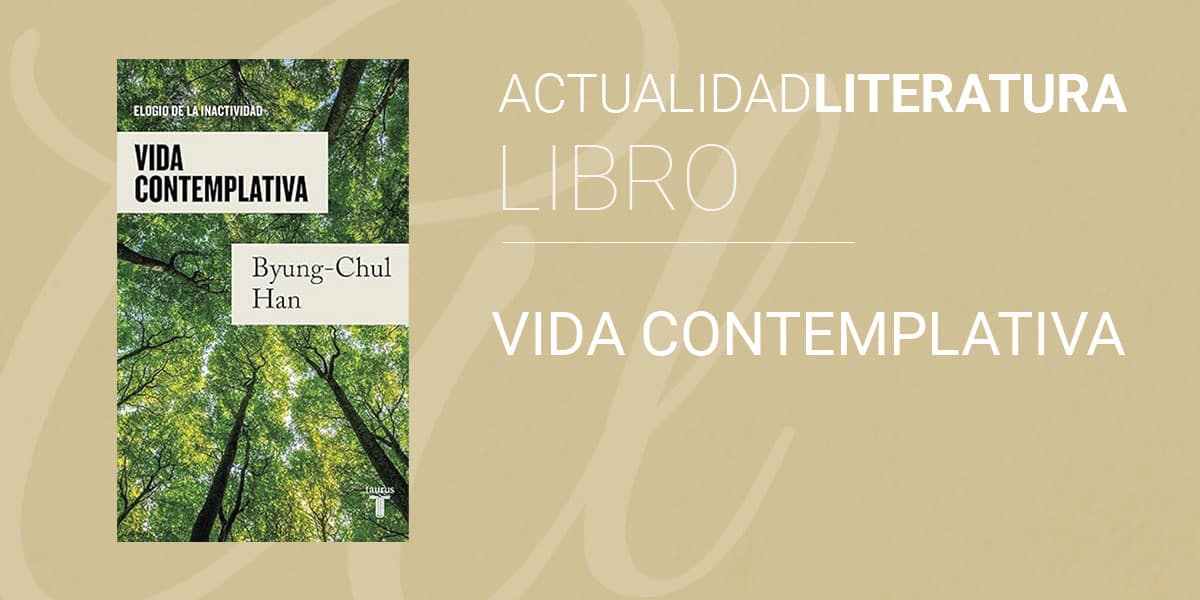
contemplative life (Taurus, 2023) is an essay by Korean philosopher Byung-Chul Han that talks about the current pace of life that is so accelerated, compared to the calm of another possible type of existence. He speaks of the necessity and richness of doing nothing, of that contemplation that has been denied to today's society and that is despised above all.
The imbalance that the excessive productivity that governs people's lives represents in human well-being, as well as in nature, will be the main theme of this book that teaches us the art of doing nothing. A question that we must relearn in a Western world that is increasingly moving away from its most spiritual side.
Contemplative life: or the art of doing nothing
Confrontations in today's society
The word leisure, or expressions like be idle, are understood as sacrilege in this society. Laziness is confused with inactivity. For this reason, the author tries to plan moments of idleness that give rest to our hurried lives. That doing nothing does not become a mistake that makes us feel guilty or that we are seen by other people as lazy people who do nothing useful.
Perhaps one of the reasons for this book is precisely that individuals in this society are not allowed to do anything that is not profitable, productive. People are in a productivity race where performance, of any kind, is what enjoys the greatest prestige.
In recent years and with the arrival of the XNUMXst century, people have become slaves to themselves. Humanism has been relegated in favor of pragmatism and technique. The author makes a plea for more spiritual and philosophical behaviors which include some references to classical authors or to Heidegger, an author of whom Byung-Chul Han is a specialist. The way he already did with his book The society of tiredness. Thus, the author himself has received some criticism for his contributions to thought, because It has been said that his ideas add nothing new. Conclusions that support Byung-Chul Han's theory about always doing more.

Praise of inactivity
This praise of inactivity, as the subtitle of the book says, seeks to frequent activities that make us enjoy our free time fully and honestly. Doing what really fulfills us beyond work and obligations must become a task that can be understood as Useless. Since in the capitalist society of the Western world, performance and profit are always rewarded, making the little free time we have into moments of escape that once again distance us from our essence.
Byung-Chul Han also has time to make religious references. Although contemplation is very close to prayer and the spirituality inherent to human beings and from which they are moving further and further away. There is a loss of attention that disconnects man from meditation and nature.. This is also why it charges against actions aimed at serving as a means to achieve the egotistical ends that today's society claims to have.
Likewise, the dictatorship of the immediate or the prevailing impatience is a sad legacy that is being left to new generations who grow up with frustration. What it is about, ultimately, is finding balance and true harmony. The contemplative life as the art of doing nothing is understood as a need to relearn a predisposition that seems to have already been forgotten.. Since society is immersed in a race against time in which meaning and goal have been lost. A goal, by the way, that is far from being the exacerbated productivity to which life itself is relegated.

Conclusions
Contemplative Life is a short book in which the author tries to give expression to mere contemplation, lowering the levels of activity that society demands of all its individuals. A society after an advance that Byung-Chul Han sees as a retreat from the essence of man. Contemplation, reflection and stillness must have naturally positive consequences for man: a full existence in which he connects with us in the first instance. And then with others, in a healthy, peaceful and positive way. Since this seems to have been forgotten, Contemplative Life involves delving into the art of doing nothing.
About the Author
Byung-Chul Han is a theorist born in Seoul in 1959, although his training and professional career have taken place in Germany. He has studied Philosophy (University of Freiburg), and German Literature and Theology (University of Munich). He received his doctorate with a thesis on Martin Heidegger in 1994 and has been a professor of Philosophy and Cultural Studies. The books for which he is best known are The society of tiredness (2010) and The agony of Eros (2012)
